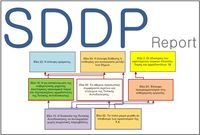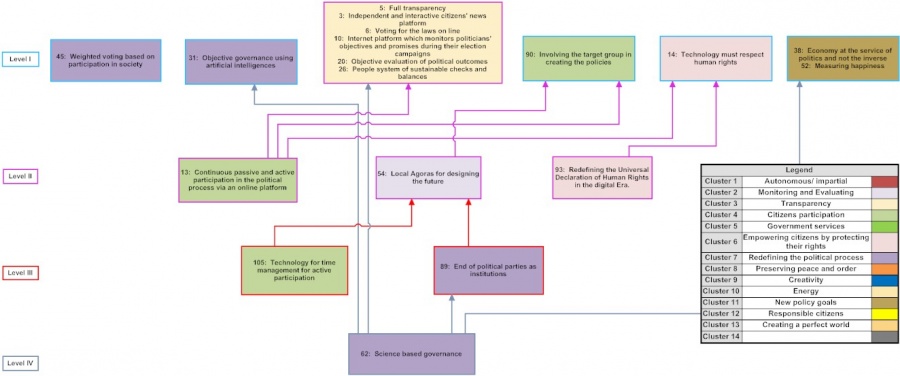SDDP Reinventing Democracy in the Digital Era: Difference between revisions
No edit summary |
No edit summary |
||
| Line 10: | Line 10: | ||
|stats=Participants=24 <br> Number of ideas=106 <br>Number of Clusters=14 <br> Ideas received Votes=55 <br> Ideas on MAP R=18 <br>Spreathink ST=50% <br>Situational Complexity SCI=7.23 | |stats=Participants=24 <br> Number of ideas=106 <br>Number of Clusters=14 <br> Ideas received Votes=55 <br> Ideas on MAP R=18 <br>Spreathink ST=50% <br>Situational Complexity SCI=7.23 | ||
|dates=14-15 September, 2012 | |dates=14-15 September, 2012 | ||
|link=[ | |link=[https://www.futureworlds.eu/w/1/Digital_Era_Report_Final.pdf Download Report]<br> [[Reinventing Democracy in the Digital Era (2012)]] | ||
}} | }} | ||
==Executive Summary== | ==Executive Summary== | ||
Latest revision as of 04:09, 9 April 2020
|
Executive Summary
This paper reports the results of a co-laboratory organized by Future Worlds Center and Digital Futures Task Force of the European Commission to explore the idea of reinventing democracy in the digital era. The purpose of this project is to bring together 24 young people from all across Europe in an attempt to envision, conceptualize and design new models of democratic governance that capitalize on the possibilities offered by contemporary as well as emerging digital technologies. The two-day event was organized as an interactive co-laboratory, fully utilizing up-to-date methodologies and technologies of the science of structured democratic dialogue. The workshop was organized using the structured dialogic design process (SDDP) approach within the context of a rich web-based communication environment. It is categorized as one of many organised under the running title Reinventing democracy.
The Triggering Question (TQ) was
What are the features of an ideal future system of governance that fully utilizes innovative emerging technologies?
In response to the TQ, the 24 participants came up with 106 characteristics, which were categorized in 14 clusters. Following the voting process, 55 ideas received one or more votes and were structured to create the influence MAP shown below.
According to the participants of this workshop, appear to be the most influential were:
- Characteristic #89, End of political parties as institutions
- Characteristic #105,Technology for time management for active participation
- Characteristic #93, Redefining the Universal Declaration of Human Rights in the digital Era
- Characteristic #13, Continuous passive and active participation in the political process via an online platform
The workshop was facilitated by Afonso Ferreira, Yiannis Laouris, Eleni Michail, Elia Petridou and Maria Georgiou. The workshop was attended by 24 participants coming from all over Europe.
In sum, the participants of the dialogue reported their satisfaction that their voices have been heard and documented and communicated their expectations for follow-up activities to address the diagnosis of their needs.
Auspices
The event is under the patronage of Mrs Androulla Vassiliou, Member of the European Commission and under the auspices of the Digital Futures , the Cyprus Ministry of Education and Culture, the Mayor of Nicosia, and YEU.
Gallery
Video
| Participants |
|---|
| Elina Antoniou |
| Katerina Fotiou |
| Romina Matei |
| Constantinos Anastasiou |
| Maria Photiou |
| Andreas Drakos |
| Andreas Andreou |
| Elia Petridou |
| Jonathan Jelves |
| Eleni Michail |
| Tania Berman |
| Afonso Ferreira |
| Charalambos Solonos |
| Maria Christodoulou |
| Demos Demosthenous |
| Kemal Degirmencioglu |
| Nicole Zwaaneveld |
| Maria Kakoulaki |
| Zoe Apostolidou |
| Danae Psilla |
| Jurriën Stutterheim |
| Romina Matei |






